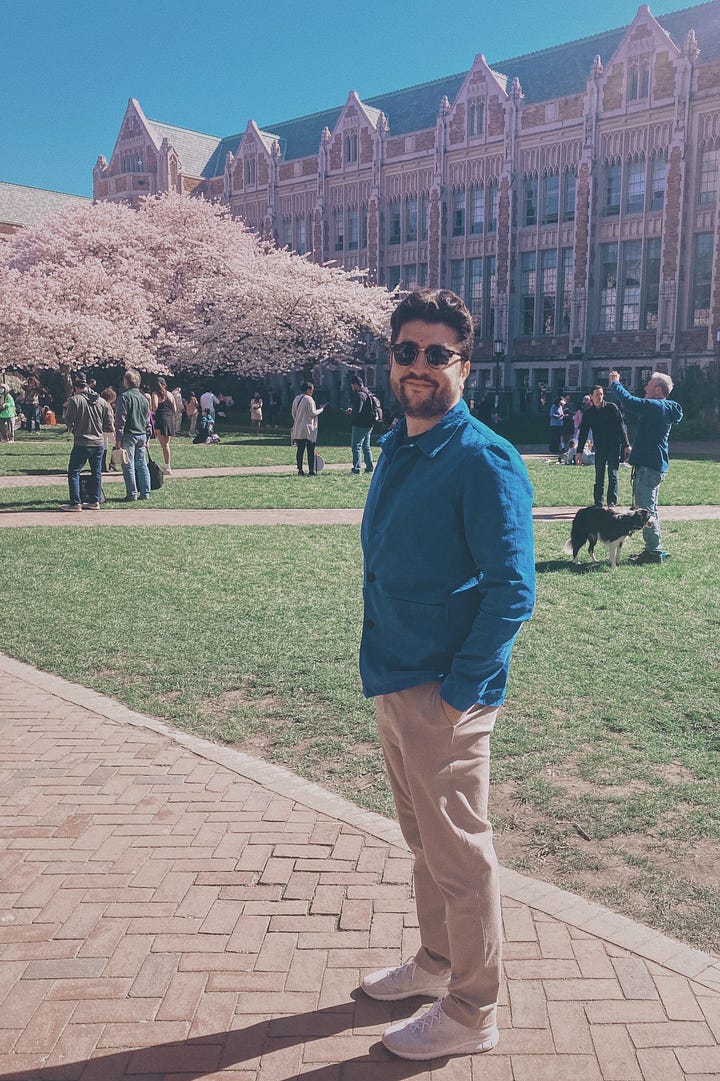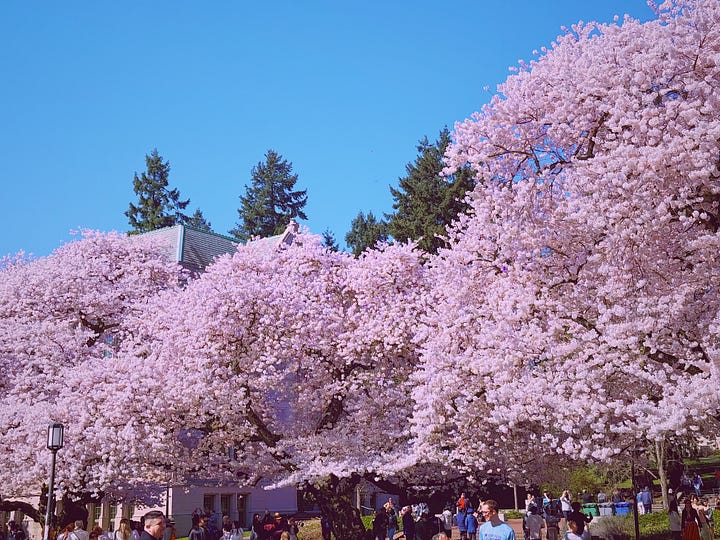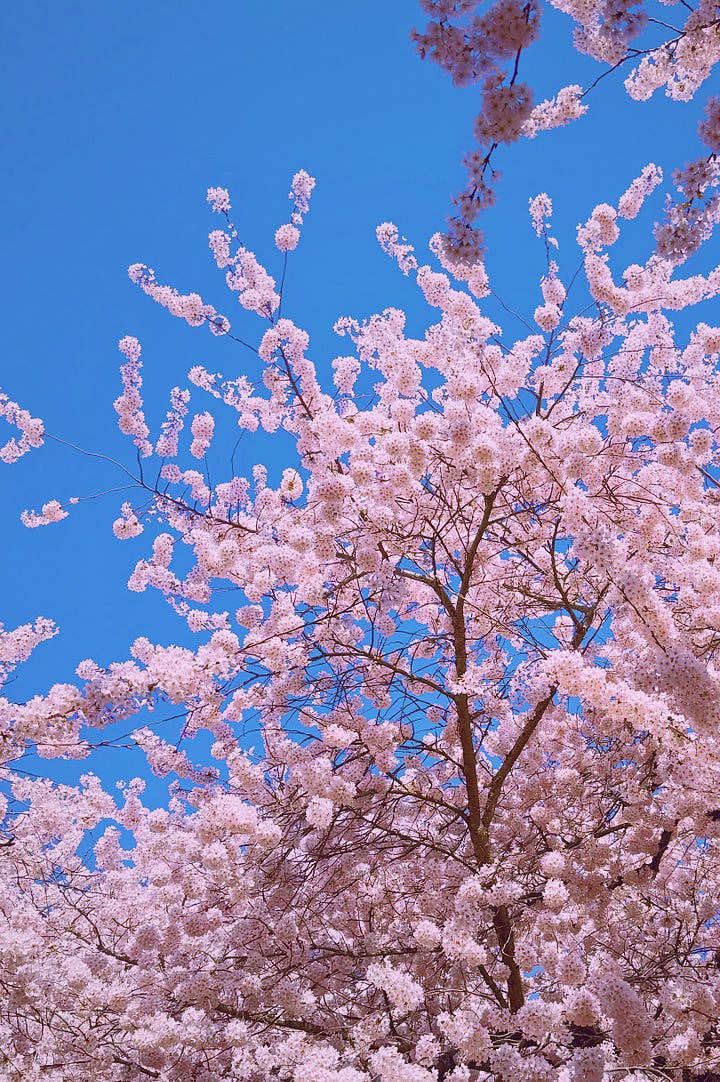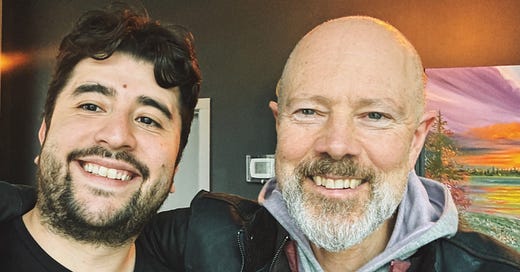Conversations with Rick
I was furiously typing in my phone’s notes app. Rick had just dropped another bit of wisdom. I needed to chase it down before it went into the ether.
You know a conversation is good when one person opens their voice memo app and the other is typing like a stenographer.
That tends to happen in conversations with Rick.
To give you some context, Rick is the nicest man on Substack. He manages to pick out the main thing you are trying to say, what it says about you, and makes you feel like a million bucks for just putting words online. Don’t believe me? He did this for over 53 writers last December.
He’s been doing all sorts of performance and public speaking for the over 20+ years. Mind you, this is someone who openly talks about his social anxiety. But he’s embraced the stage and now through Honestly Human he’s leading the charge in making sure people tell their stories.1[1]
I’m lucky to count on him as a friend.
One of his speaking gigs brought him to my neck of the woods and we had the chance to catch up.
All throughout last week I had been feeling pretty crummy—this time in my life feels like county fair roller coaster: Ups, downs, and constantly questioning if the entire thing will hold together. But a dose of Rick wisdom was what I needed. There were a couple things we talked about that I’ve been thinking about ever since.
What’s our theater?
I’ve been thinking about the idea of priming ourselves for success. In my case, it means not laying in bed, cheek smushed to the pillow, drowning morning thoughts with Instagram reels. Laying in bed as if you are hiding from the day and flooding your senses with cheap dopamine hits before you are able to even thank life/God for waking up is not a good way to start the day.
How can I ensure my mornings fill me with gratitude, purpose, and focus, so that I can perform at my best throughout the day? Paired to the first question, how do I manage the peaks and valleys of energy that naturally come as the day goes by, so that I don’t “accidentally” end up taking a 1 hour nap in the afternoon?
Part of my answer came from asking Rick about how he manages to perform at his corporate speaking gigs even when he’s having a shitty day.
Rick told me that you have to know what your “theater” is. When he arrives at the venue for his speaking gigs, his mind completely switches. The lights, the neatly organized chairs, the stage with the speakers at each flank. All of them work as signals to Rick’s mind that he is in his theater now, his arena of performance, and that no matter what happened seconds before, it’s now time to perform.
Our environment and our rituals heavily dictate our performance. This is why athletes have very meticulous pre-game routines (down to the order in which they put on their socks). This is why a singer who appears aloof and withdrawn can turn into jaw-dropping performer once they step on stage.
Most of us are not high performance athletes or singers. We spend most of our days at home or in the office. How are we turning those environments into our own theaters? And if those environments are not conducive to the performance we want, what can we do about it?
In my case, I can get into a deeper journaling flow when I go to my local coffee shop. Because when I go there, that’s my theater for writing.
Now, I’m actively thinking about the rituals and changes in my environment that I can do at home so that I start my day with a little less Instagram and a lot more energy.
What compels us to act?
A constant source of tension is the idea that, intellectually, I know where a lot of my gaps are and the things I need to do to overcome them, but I don’t take any action. The metaphor I use is that I see the prison my mind is in, I have the key, but I’m paralyzed from opening the door. Smart enough to recognize what needs to be done, too passive to do what needs to be done.
An example that comes to mind is my ability to strike up conversations with strangers. Talking to strangers seems to be a lost art in our era. Back in my college days, I would have little to no issue approaching strangers, shooting the shit, befriending them. But my social skills have atrophied over the past decade; its demise accelerated by COVID times.
While talking to Rick about this dissonance, he brought up a good point: Frustration is a good catalyst for action. However, we’ve become so good at numbing ourselves with alcohol, social media, drugs, etc., that we never let the frustration of our current circumstances grow large enough to compel action. We avoid seeing how our status quo is untenable and in the process we miss the energy that comes from realizing that we are not living in alignment with what we truly want.
Tying these two ideas together, what I’m working towards is ensuring that I am both priming myself and being extra cautious of how I numb my senses. Journaling is still a very powerful tool in bringing awareness to the conditions of my life I am unhappy with. But sitting with the discomfort for longer is what is going to propel me into action. One of the master skills in life is to learn to sit with the discomfort and embrace uncomfortable situations.
My friendship with Rick may be somewhat unconventional—we started as Internet friends, have a noticeable age gap, and grew up in very different backgrounds. But this friendship is a great reminder that strong bonds can be forged with people you never thought you could. Curiosity and vulnerability goes a long way in creating enriching relationships. I know this may sound trite and “been said before many times.” But there is a reason it’s been said before many times, and I’m a firm believer that sometimes you have to hear something 1,000 times (literally) to finally click.
Here’s to more conversations with Rick.
Cherry Blossoms
One of the highlights of spring here in Washington State are the cherry blossoms that bloom all over town. But if you really want to overwhelm your senses with beauty, then the plan is to visit the University of Washington (my alma mater) and enjoy the visual feast of cherry blossom trees in The Quad.
The trees are over 90 years old and have become an iconic emblem of UW’s campus. I’ll have to admit, back when I was a student, I didn’t care much about them, but now I’m fascinating with their vibrancy and volume. I also love seeing people’s faces glowing in awe as they look up and become hypnotized by its flowers.
I took a trip early this week with my Mom and took some photos.




Before you go…
✉️ Share this post with a friend with someone that needs to read this.
🗣️ What’s your “spring has arrived” moment in your side of the world?
🟢 Hit that lovely subscribe button if you are so inclined.
Rick recently did a podcast with Paul Millerd which I think is a great primer on his life story and philosophy.






I always love our conversations my friend. But age gap? What age gap? Next time I'll pick a cafe with a little less light.
“But a dose of Rick wisdom was what I needed.”
I’ve been on the receiving end of Rick’s elixir many times. If only Rick could sell it, he’d be a rich man.
Oh wait, he gives it away for free, which makes him infinitely wealthy and the rest of us better people.
Thank you Rick, and thank you Camilo!